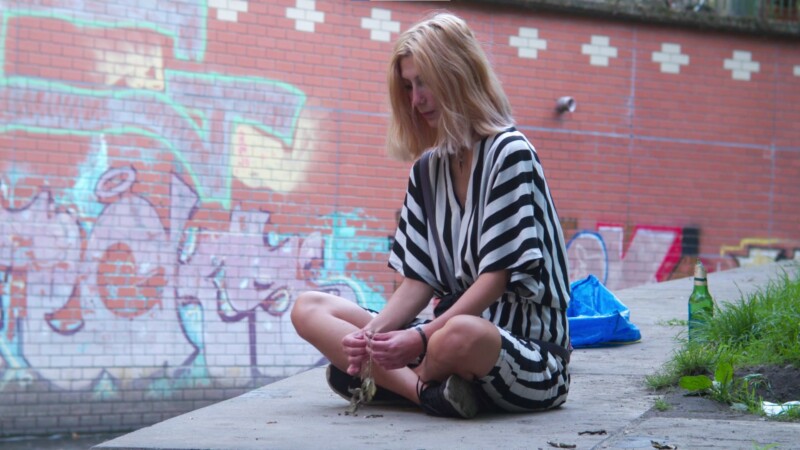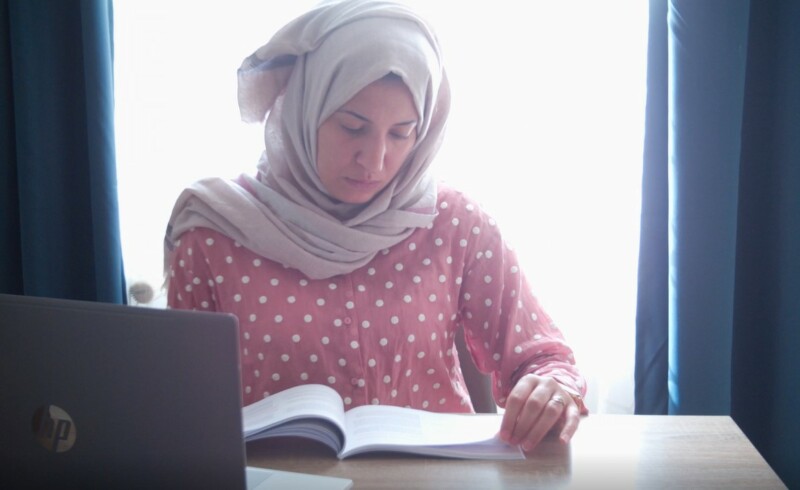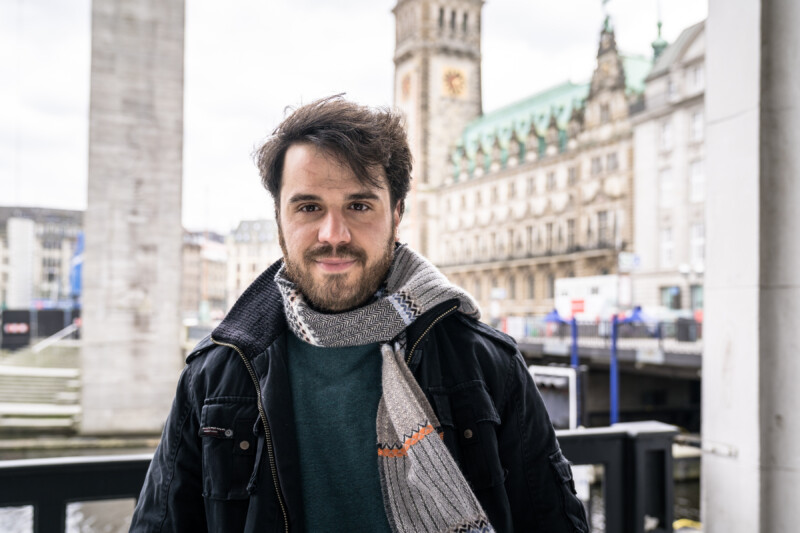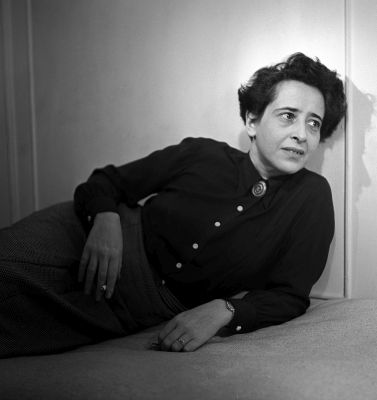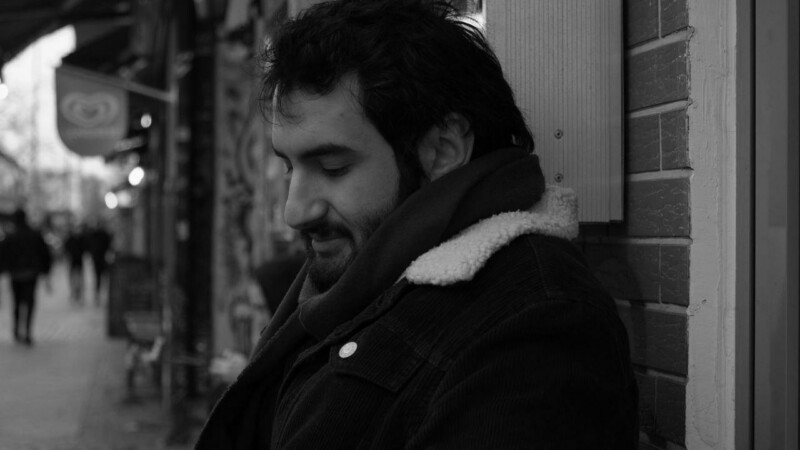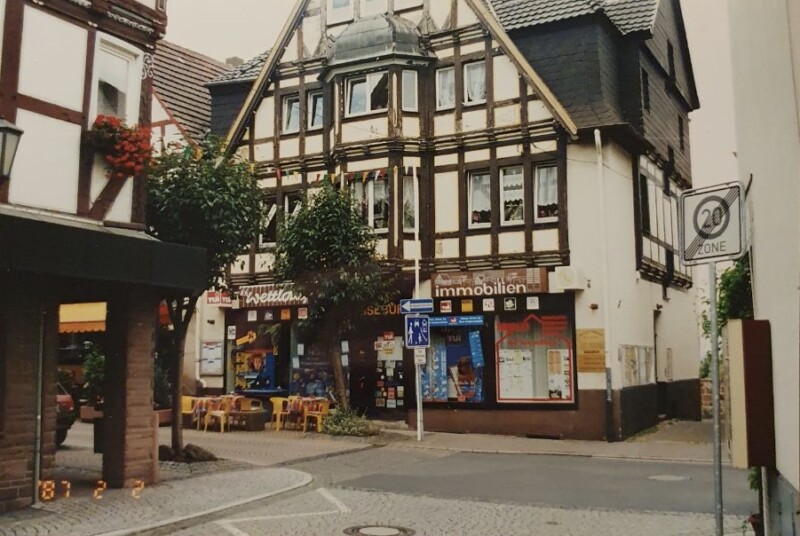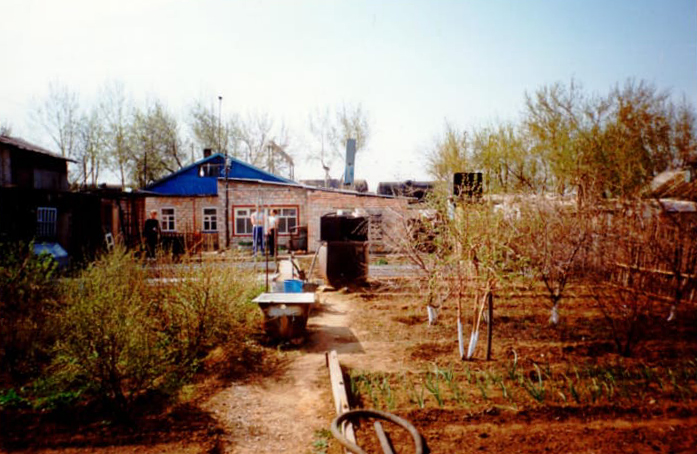Ich sehe mich nicht so richtig als geflüchtete Person, weil es für mich auch eher ein Umzug war – weil ich, glaube ich, aber auch die Kindheitsperspektive hatte. Ich weiß nicht genau, wie sich Menschen fühlen, die in ihrem Land nicht mehr leben konnten und deshalb geflohen sind und nicht, weil sie’s nicht wollten. Ich glaube, das ist ein großer Unterschied wie die Kinder es dort wahrnehmen, ob das für sie als Fluchterfahrung wahrgenommen wird, oder ob es einfach auch als ein Wechsel der Umstände wahrgenommen wird. Aber ich würde von mir nicht behaupten, ich sei eine geflüchtete Person, obwohl das halt auf dem Papier schon so ist. Also ich weiß nicht, wie sich eine geflüchtete Person fühlt, aber ich fühl mich nicht so wie eine geflüchtete Person. […]
Ich kann mir vorstellen, dass viele Kontingentflüchtlinge auch auf Grund von Zwang umgezogen sind. Also ich kann mir auch vorstellen, dass es für meine Eltern nochmal eine andere Wahrnehmung ist, also dass es in dem Sinne auch ein Zwang war, weil es für sie nicht lebenswert war in Russland weiter zu leben, weil sie das eben halt so weitsichtiger gesehen haben, als ich das gesehen hab. Aber ich glaube, es gibt irgendwie schon einen Unterschied, dass du in einem Land nicht mehr Leben kannst, durch Kriegsbedingungen oder sowas, dass du deshalb fliehen musst, weil du nicht willst, dass deine Kinder sterben, oder weil du umziehen willst, weil du deinen Kindern ein besseres Leben ermöglichen möchtest. Ja, ich glaube das ist schon ein großer Unterschied. […]
Ich weiß gar nicht genau, ob man das so benennen muss. Also wenn das zum Thema wird, wenn ich mit jemandem drüber spreche, sage ich, dass ich in Russland geboren, aber in Deutschland aufgewachsen bin. Das wird oft nicht hinterfragt, weil Menschen oft nicht wissen, dass man nicht einfach weg ziehen kann – vor allem nicht aus Russland einfach nach Deutschland ziehen kann, weil man gerne hier leben möchte. Wenn Menschen das hinterfragen, erwähne ich auch das Wort „Kontingentflüchtling“ meistens nicht: Ich erkläre, was das für ein Programm war, über das wir umziehen konnten. Weil ich glaube, bis auf eine Person wusste niemand, was das ist, mit denen ich bisher gesprochen hab. Und die eine Person hat ihre Masterarbeit darüber geschrieben. Aber ich glaube sonst Menschen, mit denen ich drüber gesprochen hab, die kannten das gar nicht, dass es überhaupt so ein Programm gab von Deutschland aus. Dass die halt die jüdischen Menschen wieder aufgenommen haben, um das jüdische Leben zu fördern. Ich kannte dieses Wort auch lange Zeit nicht, also ich wusste, dass wir über so ein Programm umgezogen sind, aber dass es eben „Kontingentflüchtling“ heißt wusste ich auch lange Zeit nicht. Ich weiß nicht, ob man da ein neues Wort für braucht, oder ob das überhaupt ein Wort sein muss. Aber ein bisschen fühlt es sich so an, als ob man die Fluchterfahrung von Anderen irgendwie weniger wichtig macht, wenn man sich selbst auch als geflüchtete Person bezeichnet.
I do not really think of myself as a refugee, because it felt more like a move for me – I think it is because I had the perspective of a child. I do not really know how people feel who could not live in their home country anymore and that is why they fled and not because they did not want to. I think there is a big difference in how the children perceive it, whether it’s perceived as a plight experience for them, or whether it’s also simply perceived as a change of circumstances. But I wouldn’t say that I am a refugee, although on paper I am. I do not know how a refugee feels, but I do not feel like a refugee. […]
I can imagine that many contingent refugees have also moved due to coercion. So I can also imagine that it is a different perception for my parents, that it was also a coercion in the sense that, for them it was not worth living in Russia, because they saw it more farsightedly than I did. However, I think there is a difference between not being able to live in a country because of war, and having to flee because you don’t want your children to die, or because you want to move to give your children a better life. Yes, I think there is quite a big difference.[…]
I don’t really know if you can call it that. So when it becomes an issue, when I talk to someone about it, I say that I was born in Russia but grew up in Germany. This is often not questioned, because people often don’t know that you can’t just move away – especially not from Russia to Germany, because you would like to live here. When people question that, I usually don’t mention the word “contingent refugee” either – I explain what kind of program it was through which we could move. Because I don’t think anybody that I’ve talked to so far but one person knew what [a contingent refugee] was. And the one person wrote their master’s thesis about it. But I think otherwise with the people I talked to about it, they didn’t know that there was such a program from Germany. That they took Jewish people back in order to promote Jewish life. I didn’t know this word for a long time either, I knew that we had moved through such a program, but for a long time I didn’t know that it was called “contingent refugee”. I don’t know if you need a new word for it, or if it has to be a word at all. But it feels a little bit like you’re somehow making other people’s flight experience less important, when you call yourself a refugee.
K. was a child when she moved from Russia to Germany with her parents and two older brothers through the so-called “Kontingentflüchtlingsprogramm” in 2000. She thus officially came to Germany as a “refugee,” but would not call herself that. In the following section, she talks about what flight means to her and questions whether designations such as “contingent refugee” even make sense. However, she can imagine that there are differences between generations in this perception. From her childhood perspective, she says, the official “flight” felt like a move – but her parents would probably have perceived it differently.
The interview was conducted, analysed and translated into English by Johanna Sünnemann as part of a cooperation between Freie Universität Berlin and the We Refugees Archive.
Under the supervision of Prof. Schirin Amir-Moazami, students in the seminar “Narratives of Refugees in the Light of Border Regime Studies” (winter term 2020/21) worked on critical methods of qualitative social research as well as literary and scientific texts on the topic of border regimes.
Border regime studies primarily focus on the political, economic and legal conditions that produce migration and borders as social phenomena in the first place.
In cooperation with the We Refugees Archive, the seminar participants conducted interviews with refugees about their everyday experiences in Germany or wrote articles on the common topics of the seminar and the archive.
